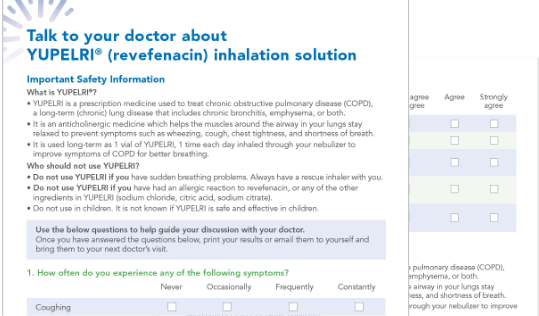Take the next step towards managing your COPD symptoms. Talk to your doctor about once-daily YUPELRI.


Breathe better
for 24 hours with
once-daily YUPELRI
Because every moment matters
YUPELRI is a nebulized long-acting prescription medicine for COPD

How is YUPELRI covered by insurance?
YUPELRI is covered by Medicare, Medicare Advantage, and most commercial insurance plans.


How do I take YUPELRI?
A nebulizer delivers YUPELRI to your lungs while you breathe calmly, deeply, and evenly.

Don’t wait another moment to talk to your doctor about once-daily YUPELRI

Stay informed about YUPELRI
Receive important updates about YUPELRI® (revefenacin) inhalation solution.Important safety information
What is YUPELRI®?- YUPELRI is a prescription medicine used to treat chronic obstructive pulmonary disease (COPD), a long-term (chronic) lung disease that includes chronic bronchitis, emphysema, or both.
- It is an anticholinergic medicine which helps the muscles around the airway in your lungs stay relaxed to prevent symptoms such as wheezing, cough, chest tightness, and shortness of breath.
- It is used long-term as 1 vial of YUPELRI, 1 time each day inhaled through your nebulizer to improve symptoms of COPD for better breathing.
- Do not use YUPELRI if you have sudden breathing problems. Always have a rescue inhaler with you.
- Do not use YUPELRI if you have had an allergic reaction to revefenacin, or any of the other ingredients in YUPELRI (sodium chloride, citric acid, sodium citrate).
- Do not use in children. It is not known if YUPELRI is safe and effective in children.
Before using YUPELRI, tell your healthcare provider about all your medical conditions, including if you:
- have eye problems such as glaucoma. YUPELRI may make your glaucoma worse.
- have prostate or bladder problems, or problems passing urine. YUPELRI may make these problems worse.
- have liver problems.
- are allergic to any of the ingredients in YUPELRI, or any other medicines.
- are pregnant or planning to become pregnant. It is not known if YUPELRI may harm your unborn baby.
- are breastfeeding. It is not known if the medicine in YUPELRI passes into your breast milk and if it can harm your baby.
Tell your healthcare provider about all the medicines you take including prescription and over-the-counter medicines, vitamins, and herbal supplements. YUPELRI and certain other medicines may interact with each other. This may cause serious side effects.
Especially tell your healthcare provider if you take:
- Other anticholinergics (including tiotropium, ipratropium, aclidinium, umeclidinium, glycopyrrolate)
- Atropine
Know the medicines you take. Keep a list of them to show your healthcare provider and pharmacist each time you get a new medicine.
What are the possible side effects with YUPELRI?
YUPELRI can cause serious side effects, including:
- Sudden breathing problems immediately after inhaling your medicine. If you have sudden breathing problems immediately after inhaling your medicine, stop using YUPELRI and call your healthcare provider right away.
- New or worsened eye problems including acute narrow-angle glaucoma.
Acute narrow-angle glaucoma can cause permanent loss of vision if not
treated. Symptoms may include:
- Red eyes
- Blurred vision
- Seeing halos or bright colors around lights
- Eye pain or discomfort
- Nausea or vomiting
- Urinary retention. People who take YUPELRI may develop new or worse
urinary retention. Symptoms of urinary retention may include:
- difficulty urinating
- urinating frequently
- urination in a weak stream or drips
- painful urination
If you have any of these symptoms, call your healthcare provider right away before taking another dose.
- Serious allergic reactions. Call your healthcare provider or get emergency
medical care if you get any of the following symptoms of a serious allergic
reaction:
- rash
- hives
- severe itching
- swelling of your face, mouth, and tongue
- difficulty breathing or swallowing
If you have any of these symptoms, stop taking YUPELRI, and call your healthcare provider right away before taking another dose.
Common side effects of YUPELRI include:
- Cough
- Runny nose
- Upper respiratory tract infection
- Headache
- Back pain
Tell your healthcare provider if you get any side effects that bother you or that do not go away. These are not all the possible side effects with YUPELRI. Ask your healthcare provider or pharmacist for more information. Call your doctor for medical advice about side effects. You may report side effects to FDA at 1-800-FDA-1088.
How should I use YUPELRI?
Read the step-by-step instructions for using YUPELRI in the Full Prescribing Information.
- YUPELRI is only for use with a nebulizer.
- Do not use YUPELRI more often than prescribed.
- Do not mix YUPELRI with other medicines in your nebulizer.
- Do not use other medicines that contain an anticholinergic for any reason.
- Do not stop using YUPELRI, even if you are feeling better, unless your healthcare provider tells you to because your symptoms might get worse.
- Call your healthcare provider or get emergency medical care right away if
- your breathing problems get worse.
- you need to use your rescue inhaler medicine more often than usual.
- your rescue inhaler medicine does not relieve your symptoms.
This summary does not include all the information about YUPELRI and is not meant to take the place of a discussion with your healthcare provider about your treatment.
Please see the Full Prescribing Information. For additional information please contact us at 1-800-395-3376.
You are encouraged to report negative side effects of prescription drugs to the FDA. Visit www.fda.gov/medwatch or call 1-800-FDA-1088.
